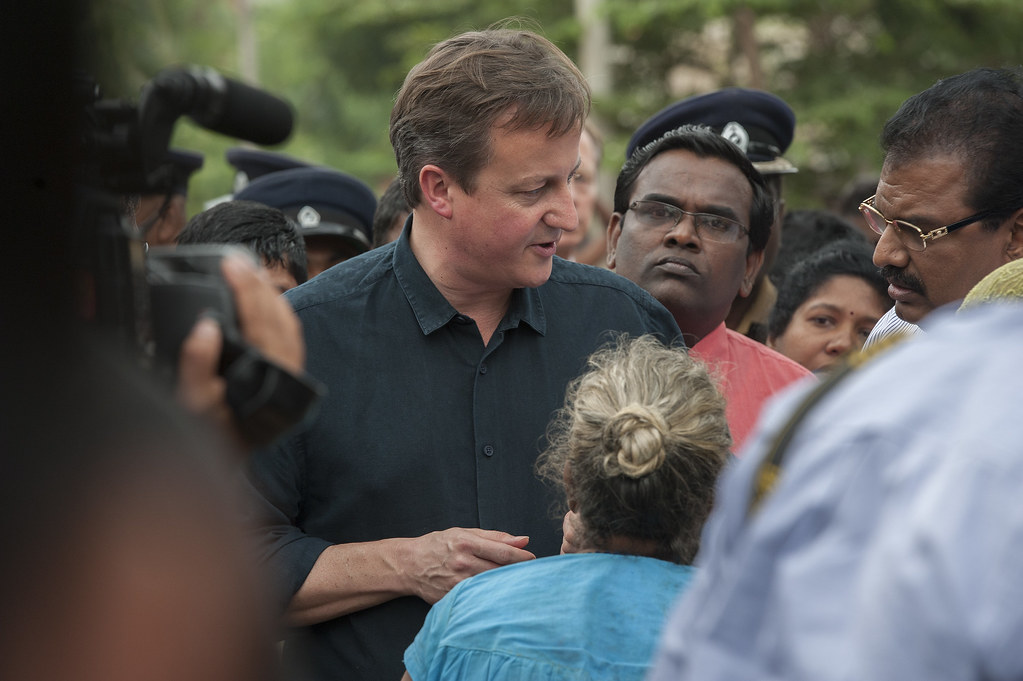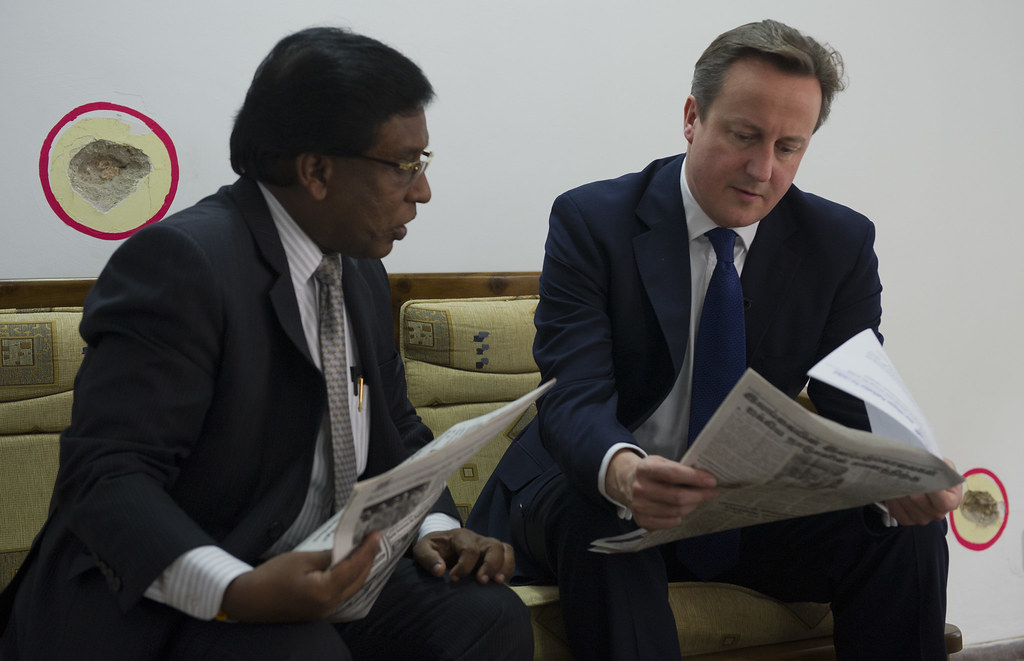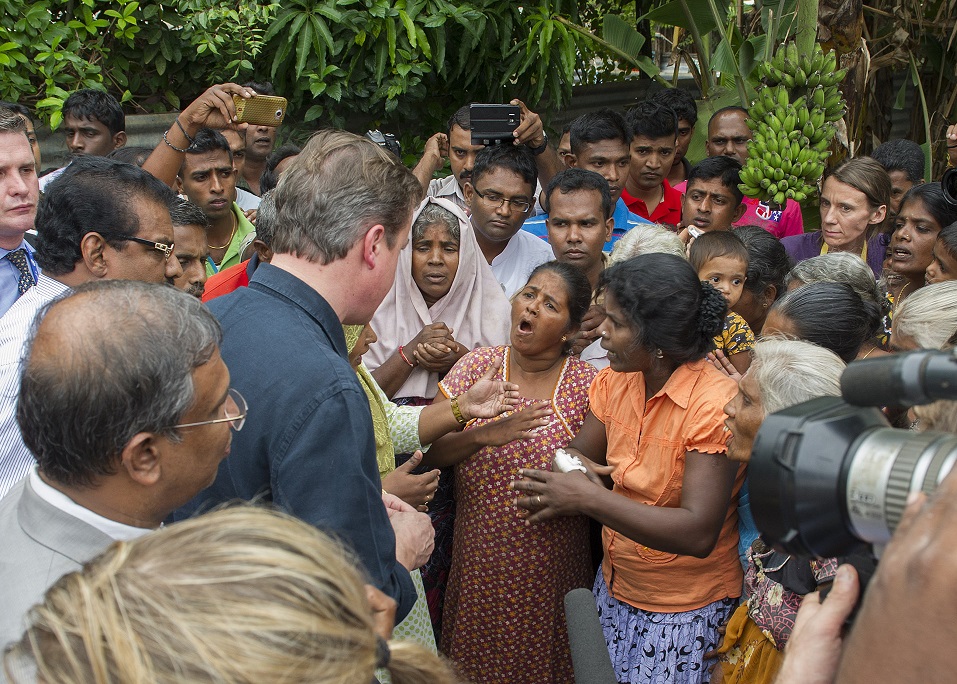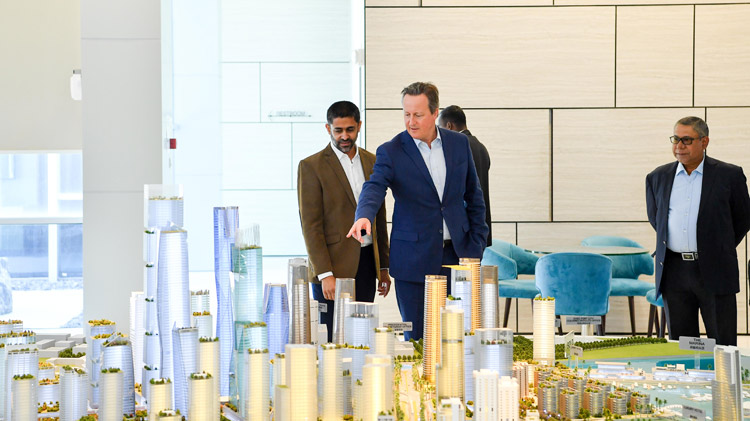
Cameron at a Jaffna refugee camp, 2013. (Number 10)
Former British Prime Minister David Cameron has been appointed as the UK’s new foreign secretary, a move that will see a familiar face return to the frontline of British politics.
David Cameron has twice written in the Tamil Guardian.
In 2013, Cameron said:
“Four years after the conflict no one has been held to account for grave allegations of war crimes and sexual violence, journalists are routinely intimidated and thousands of people have yet to find out what has happened to their missing relatives.”
“I want to see that change.”
Read his full piece: Why I am attending CHOGM – David Cameron
In 2015, Cameron wrote:
“I will never forget the faces of those I met in Jaffna.”
“Their stories of unbearable suffering and loss will stay with me forever and continue to drive me in pushing for change. What I saw and heard also underlined why I went there in the first place: to shine a light on the lack of progress and to help bring about international pressure for reform. We owe it to victims and survivors across Sri Lanka to ensure that those responsible are held to account.”
“And we will not forget them.”
Read his full piece: Sri Lanka must seize this window of opportunity - David Cameron

Cameron visited the office of a Tamil newspaper in Jaffna. The red circles on the wall mark bullet holes. (Number 10)
Shortly after his first opinion piece in the Tamil Guardian, Cameron went on to be the first world leader to visit Jaffna since World War II.
The prime minister went on to deliver a robust message to Sri Lanka’s leaders as he pledged to back an international inquiry into war crimes, refused to shake the hand of then-defence secretary Gotabaya Rajapaksa and insisted on travelling to the military occupied North-East, where he was surrounded by distraught relatives of those forcibly disappeared by Sri Lankan forces.
Read more: British Premier's historic Jaffna visit raises Tamil hopes

David Cameron meets displaced Tamils at a refugee camp in Jaffna (Number 10)
Cameron wrote about his visit to the Tamil homeland in his memoirs. He went on to speak of how Jaffna was his "first destination” once he arrived on the island. “The day I spent there will live long in my memory,” said Cameron.
“I saw what was left of Jaffna Library, whose priceless manuscripts had been destroyed by fire as government forces tried to eradicate Tamil history.”
“I visited the Tamil newspaper’s offices and met the editor, who has lived in the building for the past three years because he feared for his life. There was a charred printing press that had been shot and burned by regime hoodlums, and the walls were covered with bullet holes where journalists had been murdered.”
“I went to a refugee camp, whose existence the regime denied. I’ll never forget the crowds of women, holding up photos of young men, desperate to tell us their stories. We all had letters thrust towards us about these sons, husbands, fathers and brothers who had surrendered to the military and not been seen since. What had happened to them? Could we help find them?”
Cameron said that after his visit to Jaffna, he went to Colombo to meet then-Sri Lankan president Mahinda Rajapaksa, in a “showdown”. He noted that also present was Mahinda’s younger sibling, Gotabaya Rajapaksa. Describing the meeting, Cameron said,
“His brother, the defence minister who had supposedly issued orders for the terrible events at the end of the war, reared out to shake my hand. I kept my hands by my side, and sat down.”
“I had to make a judgement. Was this a leader who was trying to reconcile his country and have inclusive political institutions that worked for everyone? Or was he a South Asian sectionalist who wanted to secure funding for his own people alone? I thought he was the latter, and I essentially told him so. As we walked out, William Hague said it was the worst tempered foreign meeting he’d ever been in.”
Read more: Former British PM refused to shake Gotabaya’s hand in Colombo ‘showdown’
As prime minister, he spearheaded efforts on accountability for war crimes on the island and pushed for a full international inquiry into mass atrocities at the UN Human Rights Council.
Cameron served as Prime Minister of the United Kingdom from 2010 to 2016. His time out of office however became more controversial.

Cameron in Colombo, January 2023.
He visited Sri Lankan in January earlier this year, where he met with Sri Lanka’s president and was flanked by officials as he toured site of a proposed Chinese-backed project. He went on to speak at an event which sought to round up investment for the project, to the dismay of the Tamil people, human rights activists, and even colleagues within the Conservative Party.
Read more: Has David Cameron turned his back on Sri Lanka's Tamil victims?
His latest return to the frontline of British politics will now see him head up the UK’s foreign policy.
“We are facing a daunting set of international challenges, including the war in Ukraine and the crisis in the Middle East,” he said after the announcement was made.
“At this time of profound global change, it has rarely been more important for this country to stand by our allies, strengthen our partnerships and make sure our voice is heard."
"Britain is a truly international country. Our people live all over the world and our businesses trade in every corner of the globe. Working to help ensure stability and security on the global stage is both essential and squarely in our national interest. International security is vital for our domestic security. Though I may have disagreed with some individual decisions, it is clear to me that Rishi Sunak is a strong and capable Prime Minister, who is showing exemplary leadership at a difficult time."
"The UK’s Foreign Office, our Diplomatic Service, our Intelligence Services and our Aid and Development capabilities are some of the finest assets of their kind anywhere in the world. I know from my time in office that they are staffed by brilliant, patriotic and hard-working people."
"It will be an honour to serve our country alongside our dedicated FCDO staff and provide the continued leadership and support that they deserve."
We need your support
Sri Lanka is one of the most dangerous places in the world to be a journalist. Tamil journalists are particularly at threat, with at least 41 media workers known to have been killed by the Sri Lankan state or its paramilitaries during and after the armed conflict.
Despite the risks, our team on the ground remain committed to providing detailed and accurate reporting of developments in the Tamil homeland, across the island and around the world, as well as providing expert analysis and insight from the Tamil point of view
We need your support in keeping our journalism going. Support our work today.
For more ways to donate visit https://donate.tamilguardian.com.

